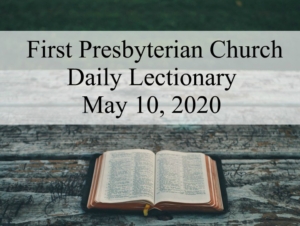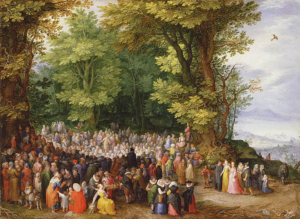
First Reading Leviticus 8:1-13, 30-36
Second Reading Hebrews 12:1-14
Hebrews 12:1-14
1Therefore, since we are surrounded by so great a cloud of witnesses, let us also lay aside every weight and the sin that clings so closely, and let us run with perseverance the race that is set before us, 2looking to Jesus the pioneer and perfecter of our faith, who for the sake of the joy that was set before him endured the cross, disregarding its shame, and has taken his seat at the right hand of the throne of God.
3Consider him who endured such hostility against himself from sinners, so that you may not grow weary or lose heart. 4In your struggle against sin you have not yet resisted to the point of shedding your blood. 5And you have forgotten the exhortation that addresses you as children – “My child, do not regard lightly the discipline of the Lord, or lose heart when you are punished by him; 6for the Lord disciplines those whom he loves, and chastises every child whom he accepts.” 7Endure trials for the sake of discipline. God is treating you as children; for what child is there whom a parent does not discipline? 8If you do not have that discipline in which all children share, then you are illegitimate and not his children. 9Moreover, we had human parents to discipline us, and we respected them. Should we not be even more willing to be subject to the Father of spirits and live? 10For they disciplined us for a short time as seemed best to them, but he disciplines us for our good, in order that we may share his holiness. 11Now, discipline always seems painful rather than pleasant at the time, but later it yields the peaceful fruit of righteousness to those who have been trained by it.
12Therefore lift your drooping hands and strengthen your weak knees, 13and make straight paths for your feet, so that what is lame may not be put out of joint, but rather be healed.
14Pursue peace with everyone, and the holiness without which no one will see the Lord.
In her book Gilead, Marilynne Robinson tells a story of three generations of pastors in a small town in Iowa. The eldest, the Grandfather in the story, leaves to fight in the Civil War. His son finds him terribly wounded to which the grandfather replies, “I am confident that I will find a great blessing in it.” “The Lord disciplines those whom he loves” is perhaps the last thing we want to hear right now. We don’t want to think that God is behind the suffering all around us—the sickness we see on TV; the economic hardship and depravation that uncovers tremendous need and creates new vulnerability; the sadness that comes with the realization that it will be a long time before anything resembles “normal,” no matter how many people wish it to be. No matter what the suffering is, we don’t want to think it comes from God so that we will learn. But that doesn’t mean we can’t wrestle a blessing out of this time. “Therefore lift your drooping hands and strengthen your weak knees, and make straight paths for your feet, so that what is lame may not be put out of joint, but rather be healed.” Maybe Hebrews indicates something we can do to turn things to the better—specifically, strengthen weak knees and lift drooping hands. Bent knees and raised hands suggest an ancient posture of prayer. Perhaps the people who received this letter had forgotten the way. And for all the problems of hardship, if they recovered their prayers, maybe it would be worth it. I am confident that I will find a great blessing in it.
Raise our hands and strengthen our knees, God of grace, that we would be ready to receive the blessing you have prepared for us, even as we struggle through the anxiety of life and the challenge of prayer.
Art: Bruegel, Jan, 1568-1625. Sermon on the Mount, from Art in the Christian Tradition, a project of the Vanderbilt Divinity Library, Nashville, TN. http://diglib.library.vanderbilt.edu/act-imagelink.pl?RC=55346
